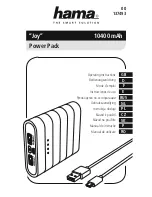
User Manual
76
KDC Series II DC Power Supplies
6.4 Power Module (A9 through A11)
Refer to Figure 6-3 for a block diagram of the DC module. The DC module rectifies and filters
the AC mains voltage, switches the voltage with a phase modulated full bridge converter, passes
the switched voltage through a voltage scaling isolation power transformer, rectifies and filters
the output voltage, and directs the voltage to the output via bus bars.
The module mostly consists of the long amplifier board (A4), the small snubber (A5) and output
filter (A6) boards, electrolytic filter capacitors on the input and output, power transformer, current
sense transformer in the primary path of the power transformer, output rectifiers, and output
inductor. Power semiconductors are soldered to the amplifier board to provide various functions.
A heat sink provides not only a low impedance thermal path for the module, but also the
structural base to which most of the components are mounted.
The AC mains from the three phase AC power bus enters the DC module at E1/E2/E3. The
voltage passes through fuses and then a full wave rectifier (CR8-CR13). The DC voltage is
filtered and stored on two electrolytic capacitors. The capacitors are configured in parallel for
208 volt mains or in series for 400/480 volt mains. High inrush current to the electrolytics is
limited by a resistor. The resistor is shorted out by an SCR, CR14, during module operation.
The rectified/filtered mains voltage provides the high power bus for the H-bridge converter. The
converter is phase-
shift pulse width modulated using four IGBT‟s, Q12-Q15. The 93.75 kHz
PWM clock frequency yields a 46.9 kHz frequency from the output of the H-bridge to the primary
of the power transformer. A current transformer in the primary wire of the power transformer
senses over current situations and is used for protection of the H-bridge.
The secondary arrangement of the power transformer depends on the output voltage. High
voltage output models used a full-bridge arrangement. Low voltage output models use a center-
tapped circuit. The latter is shown in Figure 6-4. The snubber board (A5) holds RC snubbers to
control voltage spikes on the rectifiers. Circuit arrangement on this board varies per model
output voltage. Secondary return current is monitored with a shunt resistor and represents the
current in the output inductor. This current sense signal is used by the PWM controller for
stability and protection.
The rectified output passes through a large filter inductor, to an electrolytic capacitor, through
smaller inductors, and to a final electrolytic capacitor. A shunt in the output return lead senses
output current for measurement and current programming. The output filter board (A6) mounts
to the electrolytic capacitors. This board holds small filter capacitors and remote voltage sense
circuitry. The voltage sense signals are fed back to the CPU controller assembly through the DC
module amplifier board.
A thermal switch on the DC module heat sink opens if the monitored temperature is too high.
This disables the DC module and is reported by the CPU controller.
A discharge circuit on the DC module amplifier board sinks current from the output electrolytic
capacitors to quickly remove charge from the output. The level of discharge depends on the
model output voltage and amount of external capacitance added by the user.
Note:
This bus bar is always live, even if the front panel On/Off switch is in the
Off position. Use extreme cautions when servicing any part of this
product.
Each power module is made up of three PCB's, A4 through A6.
Summary of Contents for KDC 100-100
Page 2: ......
Page 10: ......
Page 26: ...User Manual 16 KDC Series II DC Power Supplies Figure 3 1 Location of rear panel connectors ...
Page 33: ...User Manual KDC Series II DC Power Supplies 23 Figure 4 3 Front panel layout ...
Page 82: ......
Page 83: ...User Manual KDC Series II DC Power Supplies 73 Figure 6 1 DC Power Supply Block Diagram ...
Page 111: ...User Manual KDC Series II DC Power Supplies 101 Figure 8 2 Replaceable Fuse Locations ...















































